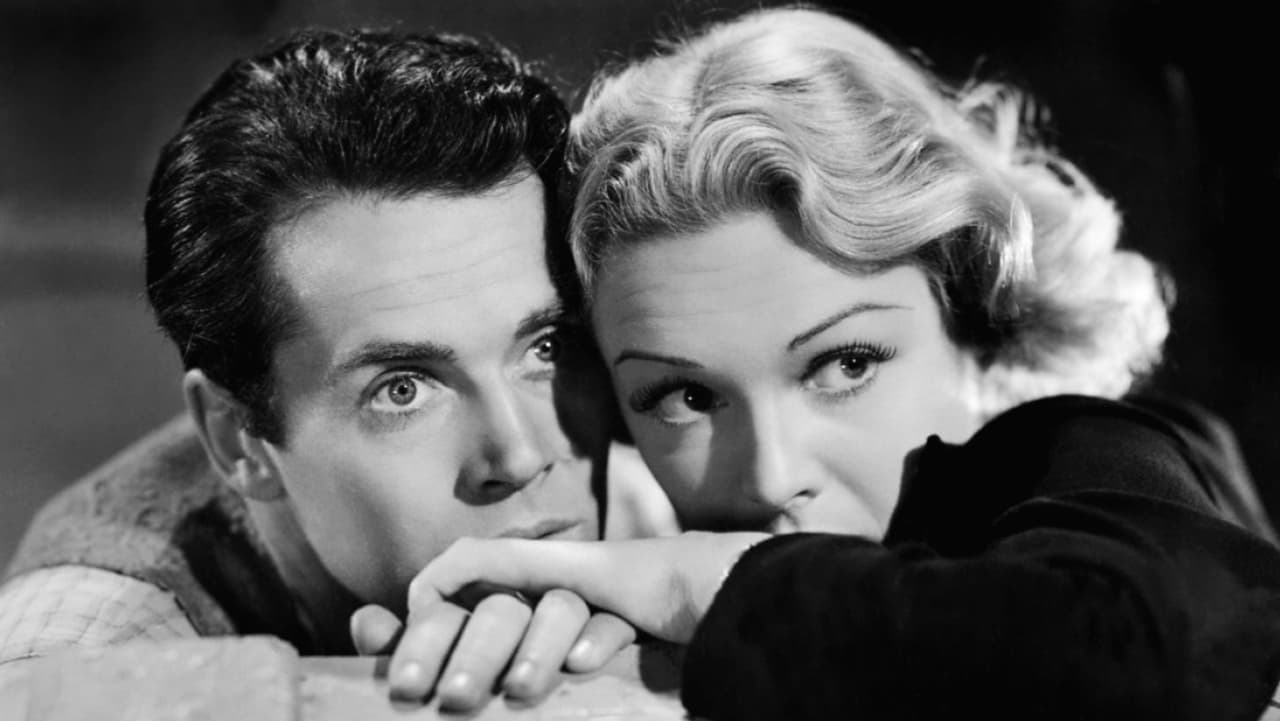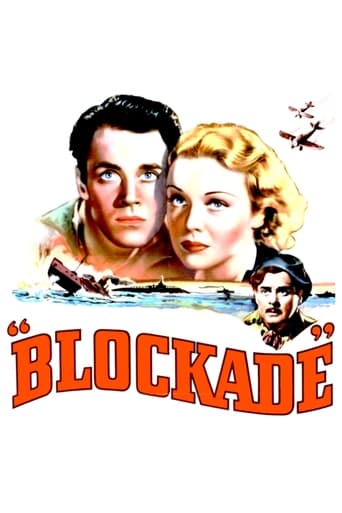


¨Blockade¨ is a passable film unmistakeably set against the background of Spanish Civil War (1936-1939) directed by William Dieterle , the original title of this film was "The River is Blue" and the first director was Lewis Milestone . The title was changed to "Castles in Spain," then to "Blockade" . It deals with two simple sheperd named Marco (Henry Fonda) and Luis (Leo Carrillo) who are forced to take up arms to defend his land during the Spanish Civil War . Along the way Marco falls in love with Russian aristocrat called Norma (Madeleine Carroll) whose father named Basil (Vladimir Sokoloff) is involved in espionage . Later on , Norma is also obligated to spy for Andre Gallinet (John Halliday) . There takes place a blockade about the small location named Castelmare with posters explaining : ¨Warning . Do not discuss military matters with strangers . Beware spies ¨. The story doesn't take sides and was prohibited in some American cities in USA day since . Of course , it was also banned in Spain . The tale does not attempt to favor any cause in the present conflict. Care has been taken to prevent any costume of the production from being accurately that of either side in the Spanish civil war . The film was nominated Best Music, Original Score composed by Werner Janssen . Kurt Weill even wrote music for the original project that was never used. The movie can be seen nowadays as a War/romance/drama with some exciting images , well organized crowd and thrilling scenes . The topic of the Spanish Civil War was politically sensitive and there is some hint that the upheavals of the original project were due to the political content of the film. Much of the dialogue for the movie was supplied by the black-listed John Howard Lawson who was nominated ACademy Award for Best Writing, Original Story and novelist James M Cain (though uncredited and famous author of ¨The postman always rings twice¨) wrote interesting dialogs . The picture was professionally directed by William Dieterle but this film Blockade(1938) was too libertarian to keep him completely from the shadow of suspicion as a socialist sympathizer. This German director had great artistic style and worked with much energy in providing some of Hollywood's and the world's crown jewels of cinematic art. He immigrated to the US and was in Hollywood by 1930s with the offer of directing for Warner Bros. and began directing their series of German-language versions of released films, including: Those Who Dance (1930), The Way of All Men (1930) and subsequently directing dramas (Scarlet down , Fog over Frisco , Fashions), costumer (Kismet,Omar Khayyan) and biopics (Life of Emile Zola , Dr Ehrlich , Juarez , Madame Curie , Reuter) that were a revelation at the box-office. Dieterle some of Warner's American output (his first, The Last Flight (1931), is now regarded as a masterwork) which would ramp up to his being at the helm of six pictures a year through 1934. After that , he directed an extravaganza ,William Shakespeare's "A Midsummers Night's Dream" . Dieterle would direct Paul Muni for Warner's in three first-rate Bio movies: The Story of Louis Pasteur (1936), The Life of Emile Zola (1937), and Juarez (1939) Oscar nominations in all of them. After that , Dieterle moved on to do The hunchback of Notre Dame (1939) at RKO with Charles Laughton as Quasimodo that was one of Dieterle's best efforts . Through the 1940s, Dieterle moved around among the studios executing always vigorously wrought film work, such as, two 1940 Bios with Edward G. Robinson at Warner's. He became associated with independent producer David O. Selznick and actor Joseph Cotten first with his direction of I'll be seeing you (1944). Rating 'Blockade' : 6 , acceptable and passable . Worthwhile watching .
... View MoreIn the spring of 1936 in Castelmare, the peasants Marco (Henry Fonda) and Luis (Leo Carrillo) help the aristocratic Russian Norma (Madeleine Carroll) that had a car accident while driving to the house of her father Basil (Vladimir Sokoloff) and Marco falls in love with Norma.Sooner the Spanish Civil War begins and Marco leads a group of peasants to defend Castelmare and he is assigned lieutenant of the rebels' army. Meanwhile, Basil and Norma are forced to spy for Andre Gallinet (John Halliday). Marco suspects of Basil and follows him to his room. When Basil reacts, Marco kills him in a shooting.Meanwhile, Castelmare is under siege and without supplies, and Norma escapes from Marco. But she is blackmailed by Gallibet and forced to return to Castelmare with information about the ship that is bringing supplies for the population. "Blockade" is a shallow and corny melodrama during the Spanish Civil War (17 July 1936 to 01 April 1939). The dull romance between Marco and Norma has no chemistry and the author uses a historical event that is happening in 1938 in a neutral position and no references. The final speech of Henry Fonda's character is one of the awfullest conclusions that I have ever seen in a classic. My vote is five.Title (Brazil): "Bloqueio" ("Blockade")
... View MoreAlthough Blockade managed to get two Academy Award nominations for Best Music Score and Best Original Screenplay, time has not dealt well with the film. For Whom The Bells Toll is a great Hemingway novel and great film made from that novel and it is a far better interpretation of the Spanish Civil War. Which was still going on when Blockade was made by Walter Wanger in 1938 and released by United Artists. Wanger had under personal contract at the time Henry Fonda whom he had brought to Hollywood to recreate his Broadway starring role in The Farmer Takes A Wife. After that during the Thirties he mostly rented Fonda's services out to the studios until Fonda signed a contract with 20th Century Fox to get to play Tom Joad in The Grapes Of Wrath.One of the big problems is the casting of Henry Fonda as a Spanish peasant who joins the Republican Army and is the voice of the Spanish proletariat on screen. Fonda is just way too American in his speech to ever be convincing as anything else. As the voice of an American worker, Tom Joad in The Grapes Of Wrath, Fonda was perfect. As a Spaniard he just doesn't cut it. But he was certainly a bigger box office than the guy who should have played the part, Gilbert Roland.While still just a peasant working his fields before war comes, Fonda meets up with Madeleine Carroll who is a Russian expatriate traveling through Spain to meet her father Vladimir Sokoloff and another family friend John Halliday. She doesn't know it, but the two of them are spies. And she gets roped into their espionage game as well.The story of the Spanish Civil War is a complex one, but one of the failures of Blockade is that we never get any kind of background. Roughly speaking the bulk of the military staged a coup against the Republic of Spain and in the end which came in 1939, Francisco Franco emerged as a fascist dictator of Spain out of all the generals in revolt. But none of that is explained here in Blockade. All we know is that it's an amorphous 'them' out there making it tough on the peasants who are in fact supporting the constitutional and elected Republic of Spain.Although the wholesale bombing of civilians had first been done in Ethiopia by the Italians, civilian bombing targets were first done in Europe in the Spanish Civil War. It was new and frightening and widely covered in the domestic and foreign press. The story of Blockade centers around a coastal town in which a relief ship cannot get through. The port may have to be surrendered and with it the whole province. It's what the Nationalists are working for and the Republicans like Fonda trying to prevent, though the names Nationalist and Republican are never used.John Howard Lawson wrote the original script that got the Academy nod and he was one of the later Hollywood Ten and one who in fact made no bones about his Marxist sympathies. But this film has been so drained of politics that it's almost antiseptic.I'd say Blockade is one for fans of the leads and an interesting if mediocre way showing how Hollywood handled a burning issue of the time.
... View MoreTo paraphrase the late great Father Coughlin's jibe at the Roosevelt government's provision of "relief that failed to relieve", this inept film on the Spanish Civil War provided propaganda that failed to propagandize. That, at least to this viewer, is the only thought that lingered after suffering through almost 90 minutes of Blockade. I say this with a great deal of reluctance because I have always considered myself a great fan of both the principals of this film, Madeleine Carroll and Henry Fonda, but, alas, not even these two cinematic greats could salvage this bummer. In my quest to apportion blame I suppose the the script writer, a certain John Henry Lawson, is as good a place as any to start. The clunky lines he puts in the mouth of Fonda, a peasant hero of the so-called "republican" cause--particularly his closing monologue--are grounds for confinement in the most austere of labor camps courtesy of his obvious favorite, Comrade Joseph Stalin. I was especially struck by the tepidity of the romantic interludes with the beautiful Carroll, suggesting that a proletarian partisan like Mr. Lawson has little feeling for the more sublime side of human emotions. All of this I could excuse if Blockade offered anything approaching effective political propaganda if that was what it offered; but, at the risk of being tedious, that was precisely where it failed the most.For political propaganda that both entertains and persuades, let me suggest Casablanca. For political propaganda that offers only a few glimpses of the radiant Madeleine Carroll and nothing more, I recommend Blockade. That, unfortunately, is not enough to salvage this less than scintillating 1930s leftist pap.
... View More